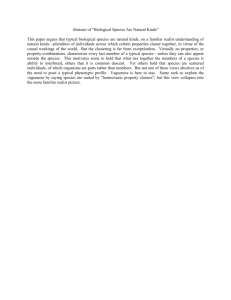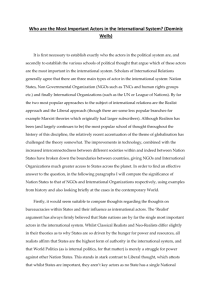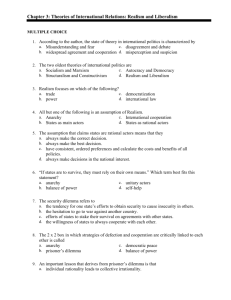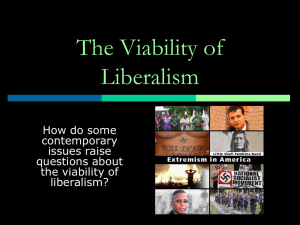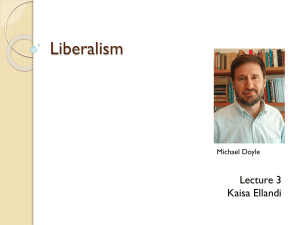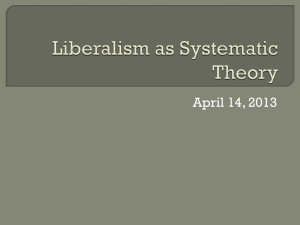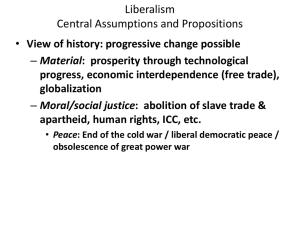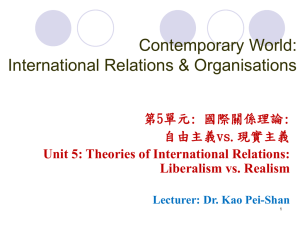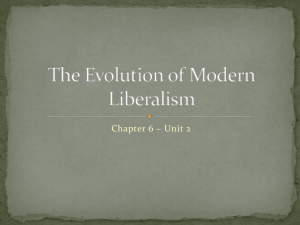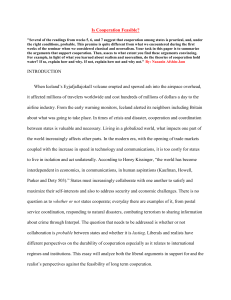As it can be seen, both liberal and realist approaches to
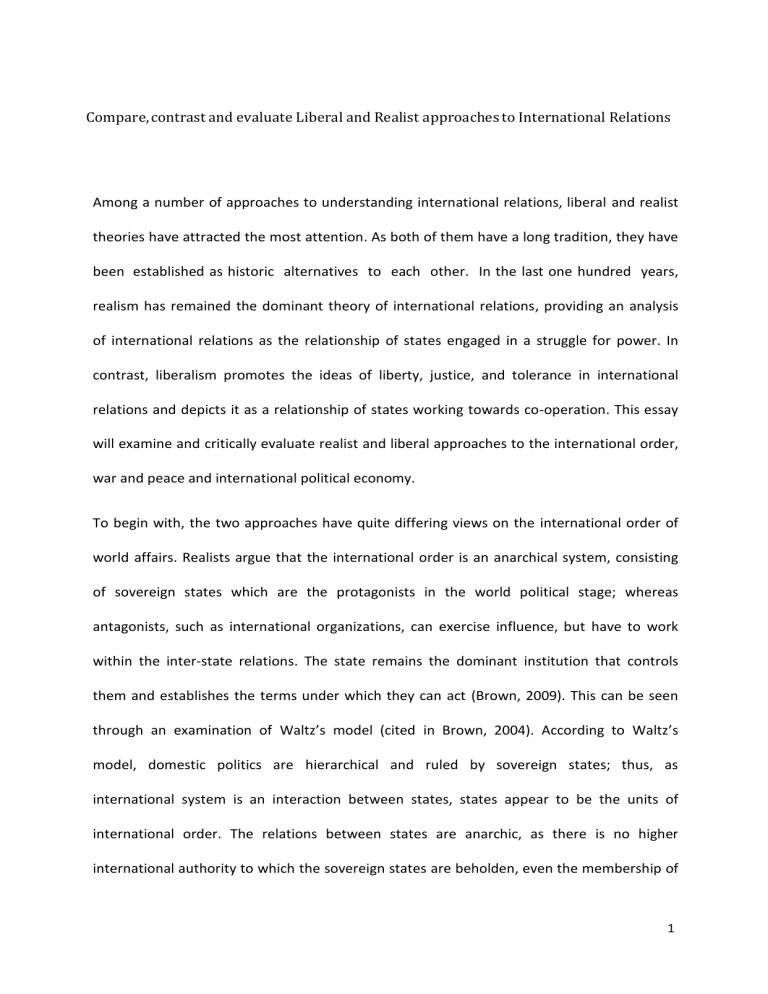
Compare, contrast and evaluate Liberal and Realist approaches to International Relations
Among a number of approaches to understanding international relations, liberal and realist theories have attracted the most attention. As both of them have a long tradition, they have been established as historic alternatives to each other. In the last one hundred years, realism has remained the dominant theory of international relations, providing an analysis of international relations as the relationship of states engaged in a struggle for power. In contrast, liberalism promotes the ideas of liberty, justice, and tolerance in international relations and depicts it as a relationship of states working towards co-operation. This essay will examine and critically evaluate realist and liberal approaches to the international order, war and peace and international political economy.
To begin with, the two approaches have quite differing views on the international order of world affairs. Realists argue that the international order is an anarchical system, consisting of sovereign states which are the protagonists in the world political stage; whereas antagonists, such as international organizations, can exercise influence, but have to work within the inter-state relations. The state remains the dominant institution that controls them and establishes the terms under which they can act (Brown, 2009). This can be seen through an examination of Waltz’s model (cited in Brown, 2004). According to Waltz’s model, domestic politics are hierarchical and ruled by sovereign states; thus, as international system is an interaction between states, states appear to be the units of international order. The relations between states are anarchic, as there is no higher international authority to which the sovereign states are beholden, even the membership of
1
organizations, such as the United Nations or NATO, is unable to affect state sovereignty
(Brown, et al., 2004).
At the same time, liberalism itself has a wide variety of approaches to the international order. One of them is defined by Moravcsik (cited in Brown, 2004) who makes three core assumptions that build a ‘bottom-up’ view of the international order. First, he states that it is individuals and private groups of individuals; such as international organizations, economic enterprises and pressure groups, that play a central role in international relations; their competitive interests require the creation of a more co-operative society. The state consists of bureaucracies which possess the domestic decision-making process, representing the dominant subset of interests. Therefore, excluding the possibility of existence of a unitary state, consequently, causing its actions to be socially defined. Finally, behaviour of the state lies in the interdependence of state preferences. Thus, co-operation can be achieved provided the state preferences are similar. The nature of international order and the state-system itself are likely to change in a progressive direction (Brown, 2004).
Therefore, it can be said that liberalism is a theory of governance both within and between states and peoples all around the world (Baylis, 2011).
As it can be seen, both liberal and realist approaches to international order contradict each other. It can be argued that neither of them is absolutely justified. The realist approach seems to be more exaggerated and limited to the assumption that state sovereignty and international anarchy are what dictates the state interaction, whereas the liberalist approach seems to underestimate the role of the state and overlook the possible results in case of the emergence of conflicting interests.
In addition to the contrasting views on the international order, realism and liberalism have different views on war and peace. Realists argue that war is an inevitable result of anarchy.
2
It is claimed that the global politics represents the struggle for power. States take measures to prevent the situation of any one state dominating, which is what creates the balance of power that is crucial for peace and justice, by extension meaning that military force is an option to help implement foreign policies. The importance of co-operation and diplomacy in order to counter the threat is high, but the possibility of conflict always exists (Baylis, et al.,
2011). Therefore, it is vital for every state to rely on its own military resources and give priority to the survival of national interest of the state, as anarchy means that there are no guarantees for the state’s further existence. According to Hobbes, the nature of state consists of self-interest, selfishness and rationality, meaning that each individual state will act in its own respective self-interests and will ultimately use force against other states, if required. Thus, pre-eminence of security and self-help is essential.
In contrast, liberalism does not agree with realism that anarchy is the cause of war, though anarchy can contribute to its possibility. There are three main liberal explanations for the cause of war; domestic and international interventions, uneven nature of international politics, and failure of balance of power. Therefore, liberalism sees the determinants of peace as collective security, commerce and world government. It states that through a basis of collective security strengthened by international commerce, an interdependent relationship of co-operation is achieved to prevent war and secure peace (Baylis, et al.,
2011). NATO and the EU are prime examples of this in practice, as NATO, an organization based on achieving and preserving collective security in Western Europe, works hand in hand with the EU, a union based on pan-European commerce and co-operation, to solidify a
European interdependent relationship of trust and peace.
However, there seem to be issues with both the realist and liberal arguments on the idea of war and peace. The main issue with realism seems to be that the two key ideas of the
3
importance of security and preconditioning of states’ behaviour by self-help must co-exist for any realist argument to be valid. Their argument that the self-help and security are important, underestimates the potential benefits of economic co-operation. Their assumption that states are always engaged in zero-sum conflicts with each other further develops their false view on economic co-operation, that any growth in capabilities will eventually results in growth of military power. On the other hand, liberals fail to consider the possibility of war being used as a method of solving counter-interests. This seems to prove realist critique that liberal ideas on war and peace are based upon unbalanced political formulas.
Finally, realism and liberalism have different views on international political economy, in terms of international wealth and poverty. The realist argument promotes the idea that economic relationships need to be tailored for the sake of a strong state and national interest. Wealth, as a tool for the creation of national security and prosperity, needs to be distributed by the state. Furthermore, realists insist that a free market economy is dependent on a hegemonic political power (Gilpin, cited in Jackson and Sorenson, 2006). For instance, it is claimed that decline in the US leadership, as a global hegemon, from the
1970s decreased the strength of the liberal world economy (Jackson & Sorenson, 2006).
In its turn, liberalism does have similar views to the realist idea of free market expansionism. However, liberals differ greatly on how the free market should be structured.
Unlike the realists’ view, they argue that the welfare can be only achieved by expanding capitalism beyond the boundaries of the state (Ibid). They also believe that there should not be a hegemon in the free market and, instead, all participating states should have equal powers with mutual benefits.
4
Although both arguments agree on the existence of a free market, it is difficult for them to reach a consensus, as their opinions on its structure are direct opposites of each other. It can be argued that liberals appear to have a utopian view that free markets imply peace and co-operation and this idea will work, as free markets are apolitical. As the practice of international political economy shows, the state and the market are connected very closely in symbiotic relationship, proving that the liberal views are unrealistic.
In conclusion, as the evidence and the examples show, realist and liberal approaches to international relations contrast greatly. Through a critical evaluation of both schools of thoughts, it can be said that the realist approach to international relations seems to be more plausible. Liberals fail to take into consideration the validity of their ideas on the international order, war and peace and international political economy, implemented into practice. Therefore, realists make stronger and more convincing arguments, despite the fact that some of the arguments rely on certain conditions of the actions of the state in global context being in place.
Bibliography
Baylis, J., Smith, S. & Owens, P., 2011. The Globalization of World Politics. 5th ed. New York: Oxford
University Press.
Brown, C., 2009. Understanding International Relations. 4th ed. New York: Palgrave Macmillan.
Brown, W., Bromley, S. & Athreye, S., 2004. Ordering the International: History, Change &
Transformation. London: Pluto Press.
Jackson, R. & Sorenson, G., 2006. Introduction to International Relations: Theories and Approaches.
3rd ed. London: Oxford University Press.
5
